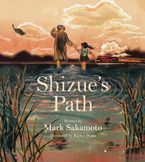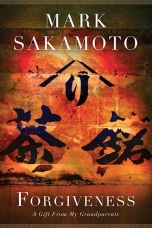Mark Sakamoto is a lawyer by training, writer, producer and entrepreneur. His biographical portrait of his grandparents Ralph MacLean and Mitsue Sakamoto told in Forgiveness: A Gift from My Grandparents (HarperCollins, 2014) was adapted by Hiro Kanagawa into a play, also called Forgiveness (Playwrights Canada Press, 2023). Sakamoto was born and raised in Medicine Hat, Alberta, and now lives in Toronto and Prince Edward County. He is currently an executive in a digital health company.

Fiction (Juvenile)
Shizue’s Path
Illustrated by Rachel Wada.
Toronto: HarperCollins, 2023.
Publisher’s Synopsis (From its website)
Framed as a conversation between a grandmother and the reader, Shizue’s Path follows the story of a young Shizue growing up in Canada against the backdrop of World War II. As the war worsens, so too does Shizue’s position in Canadian society. Torn away from her elementary school and sent to an internment camp along with her family, Shizue looks to anyone who might speak truth to power—but she is met with silence.
After the war, things only get worse for Shizue as Japanese-Canadians face the threat of deportation. Fortunately, the Canadians around Shizue are no longer silent. As various communities come together to protest this racist bill, Shizue learns first-hand how one individual can have a far-reaching effect on another’s life.
Inspired by the life of his great-aunt, Mark Sakamoto weaves personal and political history with a keen sense of justice and optimism. Enriched by Rachel Wada’s sophisticated illustrations, Shizue’s Path is an unforgettable story about a girl who, swept up by the waters of the world, uses her voice to create ripples of kindness.
Awards and Honours
2024 Richard Allen Chase Memorial Award (Finalist)

Non-fiction (Memoir)
Forgiveness: A Gift from My Grandparents
Toronto: HarperCollins, 2014.
FC106.J3 S23 2014
Publisher’s Synopsis (From its website)
When the Second World War broke out, Ralph MacLean chose to escape his troubled life on the Magdalen Islands in eastern Canada and volunteer to serve his country overseas. Meanwhile, in Vancouver, Mitsue Sakamoto saw her family and her stable community torn apart after the Japanese attack on Pearl Harbor.
Like many young Canadian soldiers, Ralph was captured by the Japanese army. He would spend the war in prison camps, enduring pestilence, beatings and starvation, as well as a journey by hell ship to Japan to perform slave labour, while around him his friends and countrymen perished. Back in Canada, Mitsue and her family were expelled from their home by the government and forced to spend years eking out an existence in rural Alberta, working other people’s land for a dollar a day.
By the end of the war, Ralph emerged broken but a survivor. Mitsue, worn down by years of back-breaking labour, had to start all over again in Medicine Hat, Alberta. A generation later, at a high school dance, Ralph’s daughter and Mitsue’s son fell in love.
Although the war toyed with Ralph’s and Mitsue’s lives and threatened to erase their humanity, these two brave individuals somehow surmounted enormous transgressions and learned to forgive. Without this forgiveness, their grandson Mark Sakamoto would never have come to be.
Awards and Honours
2014 Edna Staebler Award for Creative Non-Fiction (Finalist)
2018 CBC Canada Reads (Winner)
Links
Publisher HarperCollins Canada